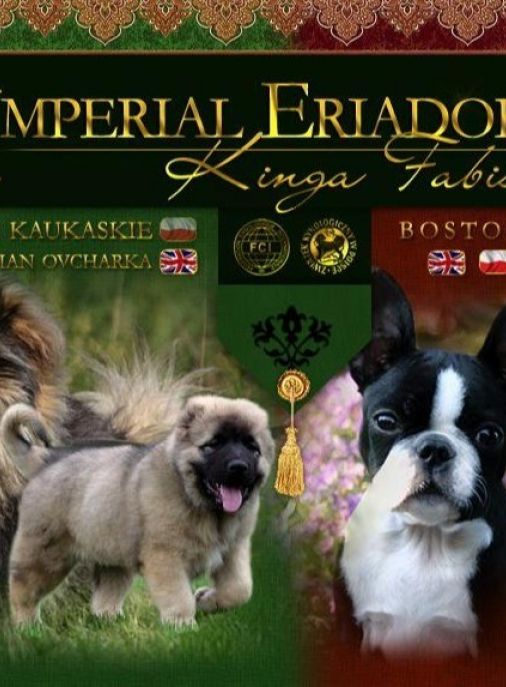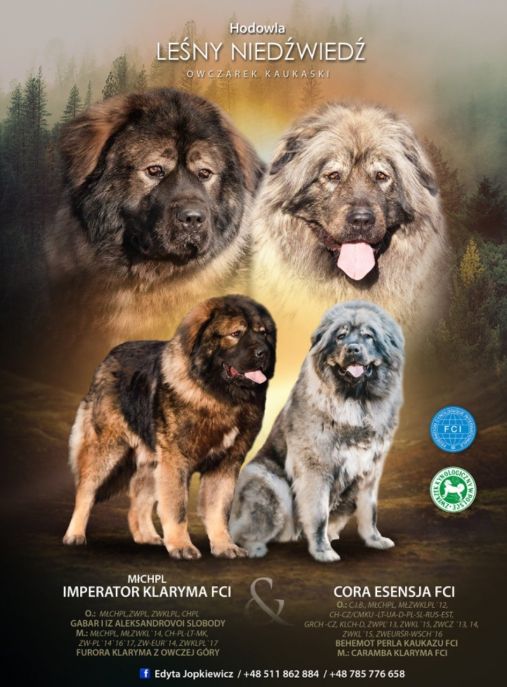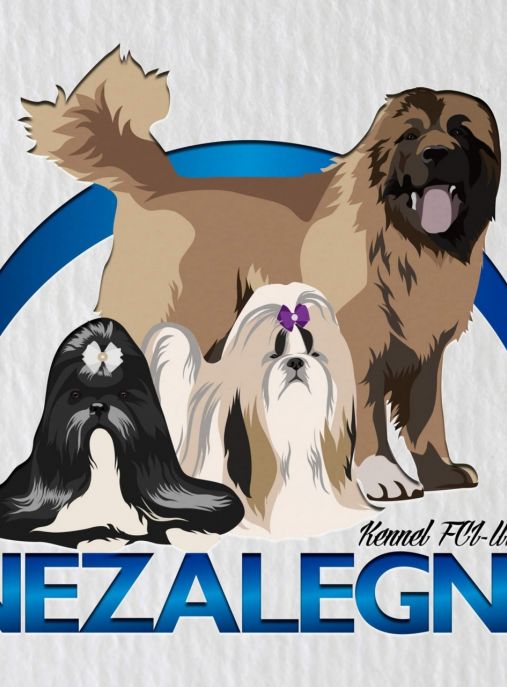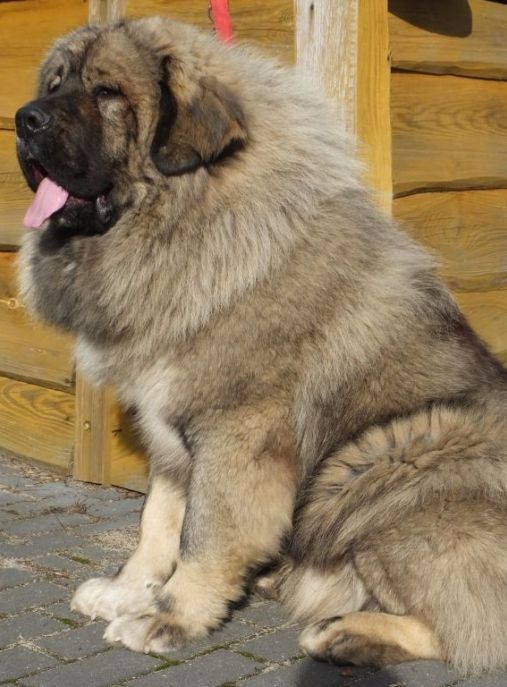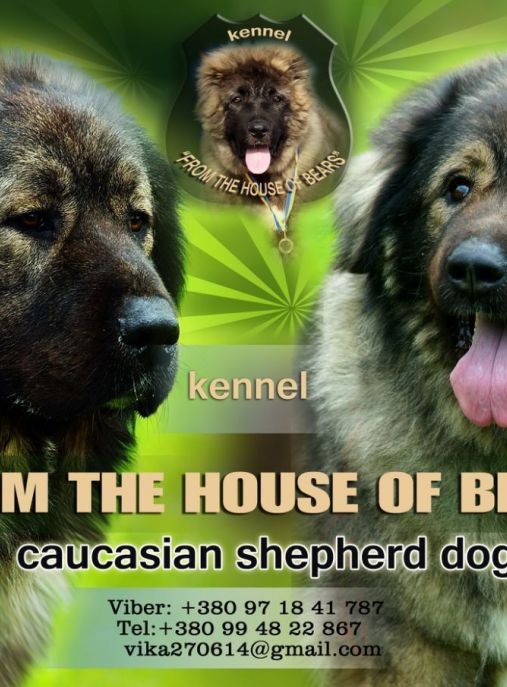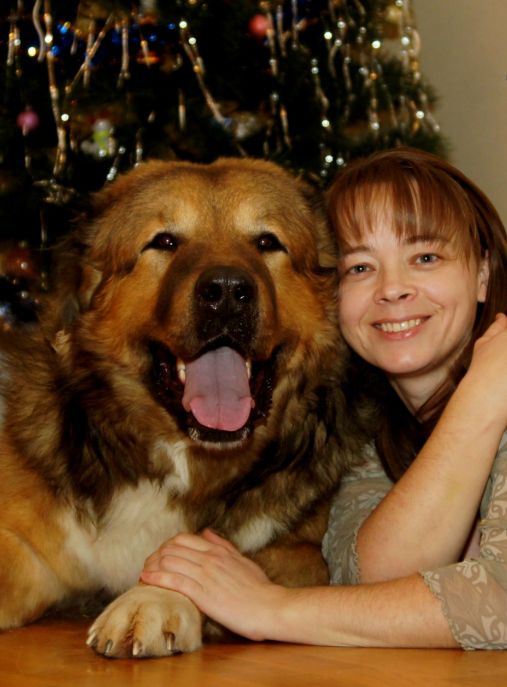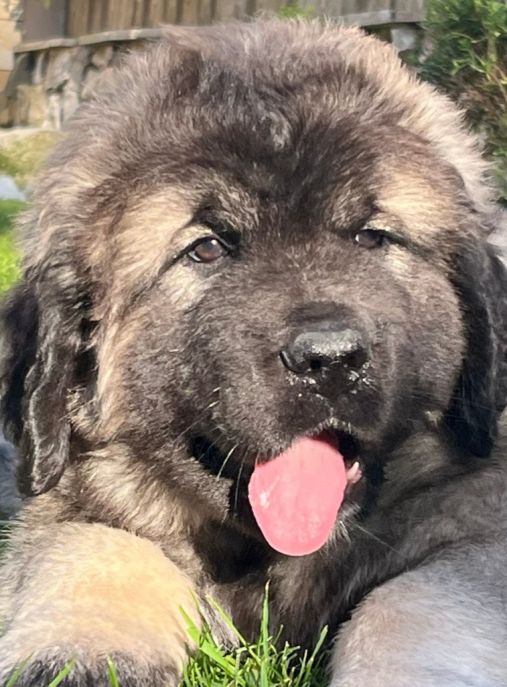The Caucasian Shepherd Dog, also known as the Caucasian Ovcharka, is a magnificent and powerful breed that hails from the Caucasus region. This breed is renowned for its impressive size, strength, and protective nature. With a history dating back centuries, the Caucasian Shepherd Dog has been a loyal companion and guardian for many generations.
The history of the Caucasian Shepherd Dog can be traced back to ancient times. This breed was primarily developed to protect livestock from predators such as wolves and bears in the rugged mountainous regions of the Caucasus. Their ability to fearlessly defend their territory and ward off potential threats made them highly valued by shepherds and farmers.
According to the FCI (Fédération Cynologique Internationale) typology, the Caucasian Shepherd Dog belongs to Group 2: Pinscher and Schnauzer - Molossoid breeds - Swiss Mountain and Cattle Dogs. Within this group, it falls under Section 2.2: Molossoid breeds, Mountain type. This classification highlights the breed's origins as a mountain dog and its Molossoid heritage.
The Caucasian Shepherd Dog is primarily bred for protection and guarding purposes. Their natural instincts make them excellent guard dogs for properties, livestock, and families. Due to their size and strength, they are not recommended for inexperienced dog owners or those who live in small apartments. This breed requires a firm and experienced handler who can provide proper training and socialization.
In terms of physical characteristics, the Caucasian Shepherd Dog is a large and robust breed. Males typically weigh between 110 to 200 pounds (50 to 90 kilograms), while females range from 80 to 150 pounds (36 to 68 kilograms). Their height at the shoulder can vary from 25 to 30 inches (64 to 75 centimeters) for males and 24 to 28 inches (62 to 70 centimeters) for females.
The life expectancy of the Caucasian Shepherd Dog is around 10 to 12 years. However, with proper care, nutrition, and regular exercise, some individuals have been known to live even longer. It is important to note that this breed is prone to certain health issues, including hip and elbow dysplasia, obesity, and allergies. Regular veterinary check-ups and a balanced diet are crucial for maintaining their overall well-being.
One of the most striking features of the Caucasian Shepherd Dog is its thick double coat, which provides excellent protection against harsh weather conditions. The outer coat is coarse and can be either short or long, while the undercoat is soft and dense. This breed comes in various colors, including white, gray, fawn, brindle, and pied. The coat requires regular brushing to prevent matting and to keep it clean and healthy.
Despite their formidable appearance, the Caucasian Shepherd Dog is known for its loyalty and affection towards its family. They are incredibly devoted and protective, making them excellent companions and guardians. However, their protective nature can sometimes lead to aggression towards strangers or other animals if not properly socialized and trained from an early age.
In conclusion, the Caucasian Shepherd Dog is a remarkable breed with a rich history and impressive physical attributes. Their role as guardians and protectors has been deeply ingrained in their DNA for centuries. While they require experienced handling and proper training, their loyalty and devotion make them a cherished member of the family for those who understand and appreciate their unique qualities.
The Caucasian Shepherd Dog, also known as the Caucasian Ovcharka, is a majestic and powerful breed that possesses a unique character. Originating from the Caucasus region, these dogs were primarily bred to guard livestock and protect their owners from predators. With their imposing size and strong-willed nature, they require experienced owners who can provide them with proper training and socialization.
In terms of character, Caucasian Shepherd Dogs are known for their loyalty and devotion to their family. They form strong bonds with their owners and are incredibly protective of them. This protective instinct extends to their territory, making them excellent guard dogs. They are always alert and vigilant, ready to defend their loved ones from any potential threat.
Due to their protective nature, Caucasian Shepherds can be wary of strangers. They are naturally suspicious and tend to be reserved around unfamiliar people or animals. Early socialization is crucial to ensure they can differentiate between genuine threats and harmless situations. Introducing them to various people, animals, and environments from a young age will help them develop into well-rounded dogs.
While they are known for their fierce loyalty, Caucasian Shepherds can also be independent and stubborn. They have a strong sense of dominance and require a firm and consistent hand in training. Positive reinforcement techniques, such as rewards and praise, work best with this breed. Harsh training methods or physical punishment can lead to fear or aggression, so it's important to approach their training with patience and understanding.
Caucasian Shepherd Dogs have a high intelligence level, but they can be challenging to train. They have a natural instinct to protect and guard, which can sometimes make them less responsive to commands. Early obedience training is essential to establish boundaries and teach them basic commands. Consistency, repetition, and positive reinforcement are key to successfully train this breed.
Exercise is crucial for the well-being of Caucasian Shepherd Dogs. They are an active breed that requires regular physical and mental stimulation. Daily walks, playtime, and engaging activities will help prevent boredom and destructive behavior. However, it's important to note that they are not suitable for apartment living due to their size and exercise needs. A spacious yard or rural environment is ideal for this breed.
When it comes to raising a Caucasian Shepherd Dog, early socialization and training are paramount. Exposing them to various people, animals, and environments will help them develop into well-adjusted adults. Providing them with consistent leadership, clear boundaries, and positive reinforcement will ensure they grow into obedient and well-behaved dogs.
In conclusion, the Caucasian Shepherd Dog is a breed with a strong character and protective instincts. They are loyal, devoted, and highly intelligent dogs that require experienced owners who can provide them with proper training, socialization, and exercise. With the right guidance, these majestic dogs can become loving and reliable companions for those who appreciate their unique qualities.
The Caucasian Shepherd Dog, also known as the Caucasian Ovcharka, is a large and powerful breed originating from the Caucasus region. These dogs were traditionally used to guard livestock and protect their families, making them highly protective and loyal. Caring for a Caucasian Shepherd Dog requires special attention due to their size, temperament, and specific needs. Here are some tips on how to care for dogs of this breed, including what to do and what not to do:
1. Adequate Space: Caucasian Shepherds are large dogs that require ample space to move around comfortably. They are not suitable for apartment living and thrive in homes with a spacious yard or rural areas where they can roam freely. Ensure your dog has enough room to exercise and explore.
2. Regular Exercise: Despite their size, Caucasian Shepherds need regular exercise to maintain their physical and mental well-being. Daily walks, playtime, and engaging activities are essential to prevent boredom and destructive behavior. However, avoid excessive exercise, especially during hot weather, as these dogs are prone to overheating.
3. Socialization: Early and ongoing socialization is crucial for Caucasian Shepherds. Introduce them to various people, animals, and environments from a young age to help them develop into well-rounded dogs. Proper socialization will help prevent aggression and fearfulness towards strangers or other animals.
4. Training and Obedience: Caucasian Shepherds are intelligent but can be independent and strong-willed. Consistent and positive reinforcement-based training methods work best for this breed. Start training early, focusing on basic commands, leash manners, and proper behavior. Professional obedience classes can be beneficial for both you and your dog.
5. Grooming: Caucasian Shepherds have a thick double coat that requires regular grooming. Brush their fur at least once or twice a week to prevent matting and remove loose hair. During shedding seasons, daily brushing may be necessary. Bathe them occasionally, using a dog-specific shampoo, and trim their nails regularly. Pay attention to their ears and teeth, cleaning them as needed.
6. Health Care: Regular veterinary check-ups are essential to ensure your Caucasian Shepherd remains healthy. Vaccinations, parasite prevention, and dental care should be part of their routine healthcare. Additionally, be aware of breed-specific health issues such as hip dysplasia, elbow dysplasia, and certain eye conditions. Regular exercise, a balanced diet, and maintaining a healthy weight can help minimize these risks.
7. Proper Diet: Feed your Caucasian Shepherd a high-quality, balanced diet suitable for large breeds. Their food should contain essential nutrients, vitamins, and minerals to support their growth and overall health. Avoid overfeeding, as obesity can lead to various health problems. Consult your veterinarian for specific dietary recommendations based on your dog's age, activity level, and any existing health conditions.
8. Guarding Instincts: Caucasian Shepherds have a strong guarding instinct, which can make them wary of strangers. While this trait makes them excellent protectors, it requires responsible ownership. Properly introduce your dog to visitors and teach them appropriate behavior around guests. Early socialization and ongoing training will help manage their protective instincts.
9. Family Dynamics: Caucasian Shepherds are known for their loyalty and devotion to their families. They thrive in homes where they are considered part of the family and receive plenty of attention and affection. Avoid leaving them alone for extended periods, as they may become anxious or develop behavioral issues.
10. Caution with Children and Small Animals: Due to their size and protective nature, Caucasian Shepherds may not be suitable for households with small children or other small pets. Supervise interactions between your dog and children, and teach both parties how to behave appropriately around each other. Always introduce new animals slowly and under controlled circumstances.
Remember, owning a Caucasian Shepherd Dog requires commitment, time, and effort. Providing them with proper care, training, and socialization will help ensure they grow into well-behaved and happy companions.
The Caucasian Shepherd Dog, also known as the Caucasian Ovcharka, is a majestic and powerful breed that originated in the Caucasus region. When it comes to their color, these dogs exhibit a wide range of shades and patterns, each adding to their unique and captivating appearance.
One of the most common colors seen in Caucasian Shepherd Dogs is a solid white coat. This pristine hue gives them an air of elegance and purity. The white coloration is often accompanied by a thick double coat, which provides insulation and protection in harsh weather conditions. The outer coat is long, coarse, and straight, while the undercoat is dense and soft.
In addition to white, these dogs can also be found in various shades of gray. From light silver to dark charcoal, the gray coloration adds depth and dimension to their overall appearance. The coat may have a mixture of lighter and darker hairs, creating a stunning contrast that accentuates their muscular build.
Another popular color seen in Caucasian Shepherd Dogs is fawn. This warm and earthy tone ranges from a pale cream to a rich golden hue. The fawn coloration often appears in combination with a black mask, which adds a touch of intensity to their facial features. This striking contrast between the light fawn coat and the dark mask creates a visually appealing and regal look.
Some Caucasian Shepherd Dogs exhibit a beautiful brindle pattern. Brindle refers to a coat that has a base color with darker stripes or streaks running through it. The brindle pattern can appear in various colors, including shades of brown, gray, or black. This unique coat pattern adds a touch of individuality to each dog, making them stand out in a crowd.
It is worth mentioning that while these colors are common in Caucasian Shepherd Dogs, they can also be found in combination with other patterns such as patches or spots. These variations further enhance the breed's visual appeal and make each dog truly one-of-a-kind.
Regardless of the specific color or pattern, the coat of a Caucasian Shepherd Dog is always dense, weather-resistant, and designed to protect them from the harsh elements of their native region. This breed's coat requires regular grooming to prevent matting and keep it in optimal condition.
In conclusion, the Caucasian Shepherd Dog boasts a wide array of colors, ranging from solid white to various shades of gray, fawn, and brindle. Each color adds its own unique charm to these majestic dogs, complementing their powerful build and regal presence. Whether they are seen in a show ring or guarding their family, the color of a Caucasian Shepherd Dog's coat is sure to captivate and leave a lasting impression.
The Caucasian Shepherd Dog, also known as the Caucasian Ovcharka, is a large and powerful breed originating from the Caucasus region. These dogs have a robust and sturdy build, with a thick double coat that provides insulation in harsh weather conditions. While they are generally healthy dogs, there are a few common health issues that owners should be aware of to ensure the well-being of their Caucasian Shepherd Dog.
One of the most prevalent health concerns in this breed is hip and elbow dysplasia. This condition occurs when the hip or elbow joints do not develop properly, leading to pain, lameness, and arthritis. Regular screening for dysplasia through X-rays is crucial before breeding, as it helps to identify affected dogs and prevent passing on the condition to future generations. Additionally, maintaining a healthy weight and providing moderate exercise can help reduce the risk of joint problems.
Another health issue that Caucasian Shepherd Dogs may face is bloat, also known as gastric dilatation-volvulus (GDV). Bloat is a life-threatening condition that occurs when the stomach fills with gas and twists on itself. It can lead to rapid deterioration and requires immediate veterinary intervention. To minimize the risk of bloat, it is recommended to feed multiple small meals throughout the day instead of one large meal, avoid vigorous exercise immediately after meals, and use elevated feeding bowls.
Like many large breeds, Caucasian Shepherd Dogs are prone to certain heart conditions, including dilated cardiomyopathy (DCM). DCM is a disease that affects the heart muscle, leading to enlargement and decreased pumping efficiency. Regular veterinary check-ups, including cardiac evaluations, can help detect early signs of DCM. A balanced diet, regular exercise, and avoiding excessive stress can contribute to maintaining a healthy heart in these dogs.
Additionally, Caucasian Shepherd Dogs may be susceptible to allergies, particularly food allergies and atopic dermatitis. Food allergies can manifest as gastrointestinal issues or skin problems, while atopic dermatitis causes itching, redness, and skin infections. Identifying and eliminating potential allergens from the dog's diet, such as certain proteins or grains, can help manage food allergies. Atopic dermatitis may require a combination of dietary changes, regular bathing, and medication prescribed by a veterinarian.
To ensure the overall health and well-being of Caucasian Shepherd Dogs, regular veterinary check-ups are essential. Vaccinations, parasite prevention, and dental care should be part of their routine healthcare. A balanced diet that meets their nutritional needs, including high-quality protein and healthy fats, is crucial for their growth and development. Regular exercise, such as daily walks and playtime, helps maintain their physical and mental health.
Grooming is another important aspect of caring for Caucasian Shepherd Dogs. Their thick double coat requires regular brushing to prevent matting and to remove loose hair. During shedding seasons, more frequent brushing is necessary to manage the excessive shedding. Bathing should be done as needed, using a mild dog shampoo to avoid drying out their skin.
In conclusion, while Caucasian Shepherd Dogs are generally healthy, they are prone to certain health issues like hip and elbow dysplasia, bloat, heart conditions, and allergies. Responsible breeding practices, regular veterinary care, a balanced diet, exercise, and proper grooming are essential for maintaining the health and well-being of these magnificent dogs.
The Caucasian Shepherd Dog, also known as the Caucasian Ovcharka, is a large and powerful breed originating from the Caucasus region. These dogs have a unique nutritional requirement due to their size, activity level, and specific health considerations. Providing a well-balanced diet is crucial to ensure their overall health and longevity.
When it comes to feeding a Caucasian Shepherd Dog, it is important to focus on high-quality, nutrient-dense food. A diet rich in protein is essential for their muscular development and maintenance. Look for dog food that lists a high-quality animal protein source, such as chicken, beef, or fish, as the primary ingredient. Avoid foods that contain excessive fillers, artificial additives, or by-products.
The ideal diet for a Caucasian Shepherd Dog should consist of a combination of commercial dog food and fresh, whole foods. Commercial dog food provides a balanced mix of nutrients, while fresh foods offer additional health benefits. Include lean meats like chicken or turkey, along with vegetables like carrots, peas, and sweet potatoes. These provide essential vitamins, minerals, and fiber.
It is important to feed your Caucasian Shepherd Dog in appropriate portions to prevent obesity. These dogs have a tendency to gain weight easily, which can put strain on their joints and overall health. Consult with your veterinarian to determine the appropriate daily calorie intake for your dog based on their age, weight, and activity level. Dividing their daily food into two or three meals can help prevent overeating.
While it is essential to provide a well-rounded diet, there are certain foods that should be avoided as they can be toxic to dogs. Some common foods that are harmful to dogs include chocolate, grapes, raisins, onions, garlic, and certain artificial sweeteners like xylitol. Additionally, avoid feeding your Caucasian Shepherd Dog bones, as they can splinter and cause choking or internal injuries.
Proper hydration is also crucial for the health of your Caucasian Shepherd Dog. Always ensure they have access to fresh, clean water throughout the day. Monitor their water intake, especially during hot weather or periods of increased activity, to prevent dehydration.
In addition to a balanced diet, regular exercise is essential for the overall well-being of your Caucasian Shepherd Dog. These dogs have a high energy level and require daily physical activity to prevent boredom and maintain a healthy weight. Engage them in activities like long walks, jogging, or playing fetch to keep them mentally and physically stimulated.
Lastly, regular veterinary check-ups are important to monitor your Caucasian Shepherd Dog's overall health and nutritional needs. Your veterinarian can provide specific advice tailored to your dog's individual requirements, including any necessary supplements or dietary modifications.
In conclusion, providing a well-balanced diet, consisting of high-quality commercial dog food and fresh, whole foods, is crucial for the nutrition of Caucasian Shepherd Dogs. Avoiding harmful foods, feeding appropriate portions, and ensuring proper hydration and exercise are also essential. By following these guidelines and consulting with your veterinarian, you can help ensure your Caucasian Shepherd Dog leads a healthy and fulfilling life.
